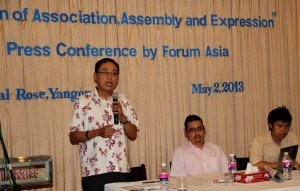Posts Tagged ‘Freedom of Assembly’ (61 found)
Press Release: Burma Must Tackle Underlying Root Causes of Protests
(28 May 2015) The Burma Government should treat the underlying structural causes of the recent outbreak of protests in Burma rather than using violence against demonstrators, Burma Partnership said in a new briefing paper released today […]
• • •Marching to the Same Tune? A Briefing Paper on Protests and Freedom of Assembly in Burma
 Background
Background
Facilitated by the proliferation of social media as an agent for social and political change over the last five years, mass organized protests have simmered and erupted across the globe. From the 2011 “Arab Spring” in the Middle East and North Africa, to the Occupy Movement in Western cities, from the 2013 Maidan Square Revolution in Ukraine, to the recent Umbrella Revolution in Hong Kong, from stifled democracy movements in Iran, Russia and Cambodia, to austerity protests in southern Europe and the 2014 race protests in Ferguson, Missouri, United States, mass protests have been a defining feature of the decade thus far. Neither is Burma a stranger to mass public protests, especially given its history of the pro-democracy student uprising in 1988 and the monk-led Saffron Revolution in 2007. While it is still premature to claim that 2015 has been another key protest year in Burma, on a par with 1988 and 2007, protests have nevertheless dominated the headlines so far this year […]
• • •ASEAN Governments Must end the Clampdown on Freedom of Expression
As the ASEAN People’s Forum (APF) is held this week in Malaysia in parallel to the ASEAN Summit of Heads of State, we call on governments across Southeast Asia to end the clampdown on freedom of expression and to halt the use of repressive laws to silence dissenting voices […]
• • •Myanmar: End Clampdown on Student Protesters and Supporters
Authorities in Myanmar must end their on-going clampdown on student protesters and their supporters, said Amnesty International today […]
• • •Official Statement of Detained Student Protesters and Supporters
Released to fellow students and general public by Community-Based Legal Assistance Network as requested officially by the detainees
• • •အမ်ဳိးသားပညာေရးဥပေဒကိစၥ ညွိႏႈိင္းေဆြးေႏြးရန္ ေက်ာင္းသားမ်ား၏လႈပ္ရွားမႈမ်ားအေပၚ အရပ္ဘက္လူထုအဖြဲ႔အစည္းမ်ား၏ သေဘာထားေၾကျငာခ်က္
Education sector reform during transition period is very important and fundamental for the future of Myanmar.The 60-day period for negotiation declared by students has expired and students have resumed their protest activities against the National Education Law. After encountering various obstacles and obstructions, student representatives met government officials in Naypyidaw on 28 January 2015 and signed an agreement committing to the quadripartite dialogue.
• • •Burma: “Peaceful Assembly Law” Fails to End Repression
(New York, January 25, 2015) – The authorities in Burma should stop arresting peaceful protesters and immediately and unconditionally free those imprisoned, Human Rights Watch said today. Burma’s donors should press for amendments to Burmese law so that it protects the rights to freedom of assembly, association, and expression […]
• • •Burma: Increased Number of Political Prisoners Calls for Renewed International Pressure
Without genuine legislative reform and sustained international pressure, the number of Burma’s political prisoners is set to steadily rise, FIDH and its member organization, the Alternative ASEAN Network on Burma (ALTSEAN-Burma), warned today […]
• • •Public Consultation Meeting on Article 18 of Freedom of Assembly and Freedom of Procession Law
A public consultation meeting on Article 18 of Freedom of Assembly and Freedom of Procession Law was held on 6 November 2013 at the office of 88 Generation Peace and Open Society in Thingangyun Township, Yangon. The forum was attended by various types of civil society organizations including Human Rights and political activist […]
• • •Burma: Human Rights Groups Condemn Ongoing Crackdown on Protests and Peaceful Assemblies
 Report Highlights Violations of Freedoms of Expression, Peaceful Assembly and Association
Report Highlights Violations of Freedoms of Expression, Peaceful Assembly and Association
The Asian Forum for Human Rights and Development (FORUM-ASIA), together with its member Human Rights Education Institute of Burma (HREIB), and Burma Partnership, called on the Burma government to respect the freedoms of expression, peaceful assembly and association […]









 All posts
All posts